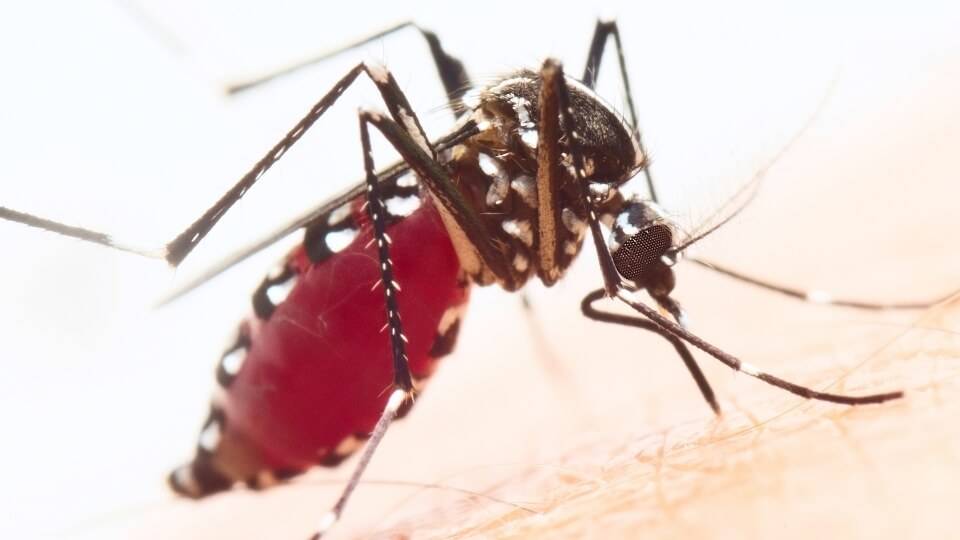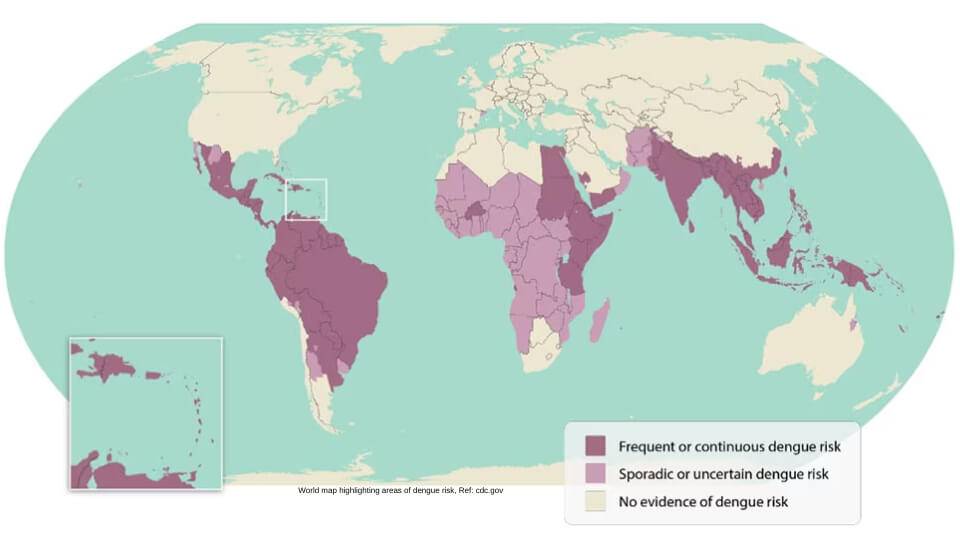
Planning to travel abroad?
Protect yourself against dengue fever with the Qdenga vaccine, now available at our Online Chemist Travel Clinic, Gorleston, Great Yarmouth, Norfolk.
Dengue is a viral disease spread through mosquito bites, prevalent in over 100 countries, including popular travel destinations in the Americas, the Caribbean, Africa, Asia, and Oceania. With nearly 4.6 million UK travelers visiting these regions annually, it’s essential to take preventive measures.
The Qdenga vaccine offers effective protection against all four dengue virus serotypes, significantly reducing the risk of infection and severe illness.
Schedule your consultation today and ensure a safer, healthier journey.
OnlineChemist Travel Clinic
82 Middleton Road
Gorleston, Great Yarmouth
Norfolk NR31 7AH
Tel: 01493 600610
Dengue is a viral disease transmitted to humans through mosquito bites, primarily by the Aedes species. It is endemic in over 100 countries worldwide, affecting millions annually. While dengue typically results in a mild illness, it can sometimes lead to severe symptoms and hospitalization. Notably, there is no specific treatment for dengue, making prevention crucial.
Approximately 4.6 million UK travelers visit dengue-endemic regions each year, including parts of North and South America, the Caribbean, Africa, Asia, and Oceania. In recent years, European travelers have also contracted dengue while visiting these areas.

Dengue fever is caused by the dengue virus, which has four different types known as serotypes: Dengue -1, Dengue -2, Dengue -3, and Dengue -4. Here’s a simple explanation:
Dengue fever is a mosquito-borne illness with symptoms that usually appear 4 to 10 days after being bitten by an infected mosquito. Here are the key symptoms and the timeline for when they typically occur:
In some cases, dengue can progress to more severe forms, such as dengue hemorrhagic fever (DHF) or dengue shock syndrome (DSS), which require immediate medical attention.
Dengue is endemic in many parts of the world, including:
Africa:
Americas:
Asia:
Europe:
Oceania and Pacific Islands:

Dengue viruses are primarily spread to humans through bites from infected Aedes species mosquitoes. An infected pregnant person can transmit the virus to their fetus. Rarely, dengue can spread through other routes.
Preventing dengue involves reducing exposure to mosquito bites and controlling mosquito populations. Here are key strategies to help prevent dengue:
By combining personal protective measures, environmental control, community involvement, and vaccination, the risk of dengue infection can be significantly reduced. For more detailed information, you can refer to the World Health Organization (WHO) guidelines and NHS recommendations.
Qdenga is a dengue vaccine designed to protect against all four serotypes of the dengue virus. It is administered in two doses, given three months apart. This vaccine is suitable for individuals aged 4 years and older and can be used in people who have never had dengue before.
The Qdenga dengue vaccine is recommended for specific groups of people to help protect against dengue fever, particularly for those who are at higher risk of exposure. Here are the key groups who should consider getting the dengue vaccine:
Travellers to Endemic Areas: The vaccine is particularly recommended for UK travellers visiting regions where dengue is endemic, such as parts of South America, Central America, the Caribbean, Africa, Asia, and Oceania. Nearly 4.6 million UK residents travel to these regions annually, making vaccination an important preventive measure.
People Aged 4 Years and Older: Qdenga has been approved for use in individuals from four years of age and older. This includes children, adolescents, and adults who are likely to be exposed to dengue through travel or living in endemic areas.
Individuals Without Previous Dengue Infection: While the vaccine can be beneficial for those who have had dengue before, it is also suitable for people with no history of previous dengue infection. This broadens the scope of protection for a larger population, including first-time travelers to dengue-prone areas.
Special Cases: In certain situations, the vaccine may be recommended for people who are at higher risk of severe outcomes from dengue infection, including those with specific health conditions or occupations that increase their exposure to the virus.
The Qdenga vaccine offers a significant level of protection against all four serotypes of the dengue virus. It’s designed to reduce the risk of severe illness and hospitalization due to dengue fever. However, it is not a substitute for other preventive measures, such as avoiding mosquito bites through the use of insect repellent, protective clothing, and staying in accommodations with proper mosquito control measures.
The dengue vaccine (Qdenga) is available at Online Chemist Travel Clinics in Gorleston, Great Yarmouth, Norfolk. We are proud members of the International Society of Travel Medicine (ISTM), ensuring high standards in travel health care.
Call us now!
01493 600610
While the Qdenga dengue vaccine offers protection for many, certain individuals should avoid receiving this vaccine due to safety concerns and specific health conditions. Here are the key groups who should not get the dengue vaccine:
Pregnant Women: The Qdenga vaccine is contraindicated for use during pregnancy due to limited data on its safety and potential effects on the fetus (Travel Health Pro).
Individuals with Severe Allergies: People who have had a severe allergic reaction (e.g., anaphylaxis) to any component of the vaccine or after a previous dose should not receive Qdenga.
Immunocompromised Individuals: Those with weakened immune systems, whether due to conditions like HIV/AIDS, cancer, or medications that suppress the immune system (such as high-dose corticosteroids), should avoid the vaccine. This is because Qdenga is a live-attenuated vaccine, which poses a risk of causing the disease in these individuals (Pharmaceutical Technology).
Children Under Four Years Old: The vaccine is not approved for use in children younger than four years old. The safety and efficacy data for this age group are insufficient.
People Over 60 Years Old: Currently, there is insufficient data on the safety and efficacy of Qdenga in individuals over 60. Therefore, it is generally recommended to avoid vaccination in this age group until more information is available (Travel Health Pro).
Individuals with Acute Illness: Anyone suffering from a moderate or severe illness, especially if accompanied by fever, should postpone getting the vaccine until they have recovered. This helps to avoid confounding the diagnosis of any illness with potential vaccine side effects.
The Qdenga vaccine, designed to protect against dengue, generally has mild side effects. Common reactions include:
Most side effects are mild to moderate and usually resolve within a few days. They are less frequent after the second dose compared to the first dose (European Medicines Agency).
Serious side effects are rare but can include allergic reactions. The vaccine is contraindicated for individuals who have had a hypersensitivity reaction to a previous dose, those with weakened immune systems due to illness or medication, and pregnant or breastfeeding women (European Medicines Agency).
You can receive the Qdenga vaccine at various travel clinics, including the Online Chemist Travel Clinic, which is a proud member of the International Society of Travel Medicine (ISTM). For convenience, you can schedule an appointment to discuss your travel plans and get vaccinated. We are based in Gorleston, Great Yarmouth, Norfolk NR31 7AH.
For more information or to book your vaccination, visit Online Chemist Travel Clinic.
To achieve effective protection against dengue, the Qdenga vaccine is administered in a series of two doses:
For more detailed information and to book your vaccination, you can visit travel clinics like the Online Chemist Travel Clinic, which offers the Qdenga vaccine.
Don’t simply rely on our claims, become part of the delighted community of thousands of customers who are experiencing the remarkable benefits!

Online Chemist
82 Middleton Road
Gorleston
Great Yarmouth
Norfolk, NR31 7AH
Phone: 01493 600610
Email: info@onlinechemistuk.net
Superintendent Pharmacist:
Obaidullah Zaman
BPharm, MPharm, PGDip (Pharmacy), MRPharmS, IP
GPhC Reg. Number: 2083409
Pharmacy Premises GPhC Reg. Number: 9011159
Monday 09:00 – 17:00
Tuesday 09:00 – 17:00
Wednesday 09:00 – 17:00
Thursday 09:00 – 17:00
Friday 09:00 – 17:00
Saturday Closed
Sunday Closed
Click here for driving directions
OnlineChemist is a trading name of Nomaz Limited.
Registered in England – 11349276.
© 2025 All rights reserved.